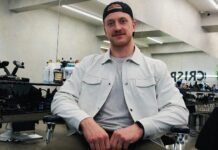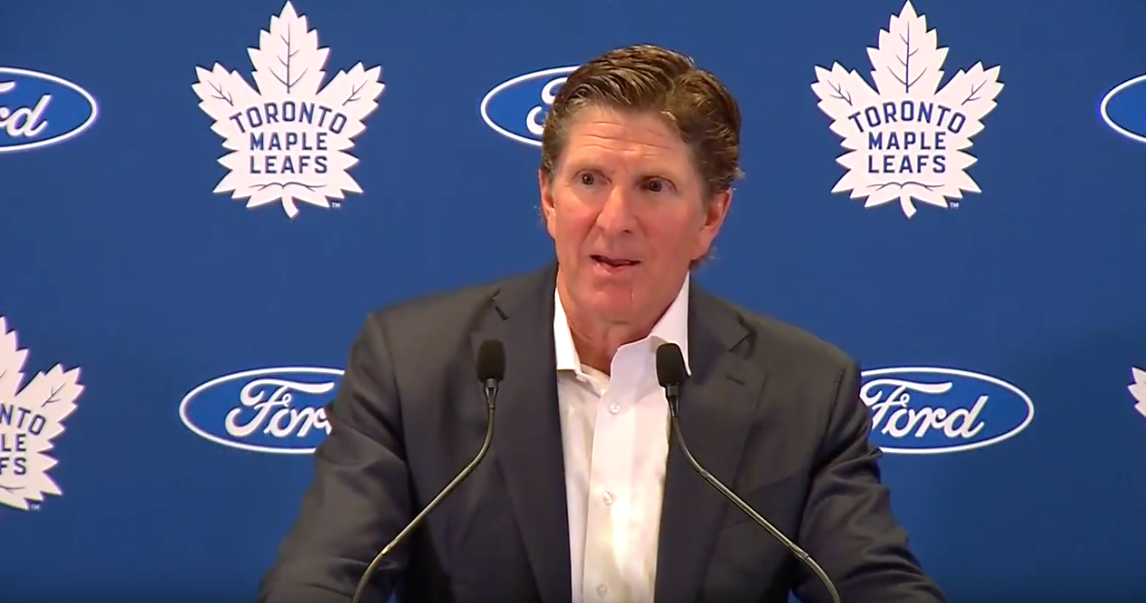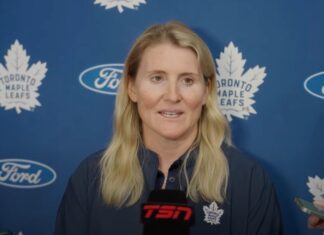Mike Babcock addressed the media at the opening of 2018 training camp.
A lot of people are already talking about April, but what do you aim to do in the 82-game regular season?
Babcock: Well, we’re not there. What we’ll do is start here today talking to the players and then we’ll try to re-establish our work ethic and our structure in training camp.
Training camp is an individual time of year. As much as we’re building a team, guys are in here, and whether you’re a kid and you’re going right back to junior, you’re trying to make an impression and you’re trying to learn from good veterans. Whether you’re a guy and you know you’re going to the American Hockey League, you’re trying to make an impression so that you can be the first callup. Whether you’re the four or five guys that are actually battling for jobs on our roster and think you’re right in, it’s those four exhibition games and what can you do with it?
Our guys — if you’re pretty much sure you’re going to be here — are you getting to play in the first minute and the last minute? Are you playing at four on four in overtime? Are you on the power play or penalty kill? How many minutes are you going to play? Those things are always up for grabs every year. What we do is we watch the players, they play, and we figure it out.
When John got signed, you talked about having an idea going into camp what the lines will be. Have you thought at all about the power play and whether you’d like he and Auston together or on different power play units?
Babcock: I’ve thought about it lots, yeah.
And?
Babcock: I thought about it lots. We’re going to work on our power play in camp. You won’t see those players together in camp just because they’re on three different teams, but when we get going, probably by game #5 of exhibition, those units will be together and we’ll get going. Obviously, everything with the power play and penalty kill is about success. When you have success, you stay together. When you don’t have success, you move around. When you have success, you go out first. If your group scores on the power play, you go out right away. If your group doesn’t score, you don’t go out. It doesn’t matter what your name is. It matters what you did.
When you first arrived here a few years ago, what would you say the biggest difference is between that point and this point now in terms of the overall feel of the organization?
Babcock: Well, come on. We were the worst team in hockey. But we were also going the wrong direction for one year, when you think about it, so that we could go in the right direction. Now, we’re on the map with other good teams. It’s interesting. When you walk around this city, the fans in our city are happy. They want more, though, and we want more, too. I think we’re set up good here for a 5-7 year run. Anybody who has been around winning in the NHL knows you need a run. It’s not about one year. It’s about a run. You’re always all in on the year you’re in, but you need a run. Not everything goes the way you want it to all the time, but steady on the rudder, stay with the same process we’ve been in.
We’ve been about finding players, developing players, and getting better. We’ll continue. As much as process was so important at the start, it is even more important now. Steady on the rudder. Just keep going. Things are going to go up, things are going to go down. We know where we want to go.
Expectations on the outside are that you’re Stanley Cup favourites. Do you talk to the guys about shutting out the noise and tempering expectations within the room?
Babcock: Our group is going to be very… when you have Patrick Marleau and John Tavares and Ron Hainsey, you’ve got guys who have been around. They’ve got some battle scars on them and they know that is just noise. The more noise you have, the more fans you have. You can’t survive and be a real good franchise without media and the noise and all of that attention. But the reality is we’re just trying to get better. We’re trying to get better each and every day. We’re trying to re-establish our work ethic and structure right here in camp. We need to have players in the right situations so their skill will come out.
You always want to get off to a good start. There is never a guarantee. You want to get off to a good start. It is hard to crawl your way out of a bad start. You want to be organized and winning early if you possibly can, so that will be focus. We’ll just try to get better every five-game segment.
Is there going to be a balancing act as far as ice time and power play usage?
Babcock: It’s interesting. The way I look at it – if the shift length is the right length, so about 42 seconds or 44 seconds at a time, everyone is going to get lots of ice time and we are going to stay fresh. It’s interesting: When we’ve played our players less, we’ve won. When we play them more, we know we’re behind and chasing the game and then we never win those games. At the end, everyone looks at the sheet. I look at the score.
The bottom line: We’re process based. You play good, you play more. There is lots of ice time to go around. On good teams, you might not get as much ice time. You get more winning. In the end, that is what it’s about.
Outside of Tavares, who are some of the new additions you’re excited about?
Babcock: I think we’ve got a real battle on D, for sure. Is it Ozhiganov? Is it Holl? Is it Rosen? Is it Borgman? Is it Carrick? Is it Dermott? There is real opportunity there.
Lindholm and Goat and these guys – Lindholm has looked really good. Goat has been here a long time. There is a battle there.
There are certain guys that we know are on the team, but where are they going to play and who are they going to play with? They’re going to determine that over time.
On Tavares, do you think the off-ice distraction is going to make it difficult to keep focused on the game? Everyone is going to want a piece of him.
Babcock: I don’t think so. The off-ice stuff is way harder for the 20-year-old. For the guy who has been around the league for a long time, he’s got a wife and he’s got a life. The idea, I believe, as a pro athlete, is that if you have a full life, you’re laughing. If you only have hockey and you leave the rink and all you do is think about hockey, you come back the next day worn out.
If you’ve got a whole life and you’ve got things sorted out… do you think Patty Marleau, when he goes home to his four boys, has time to worry about hockey? That’s why he is fresh when he comes to the rink the next day. You need a life.
It’s no different than you people. When you aren’t doing well at your job, and you just got a tightening from your boss, you go home and think about your job. When it’s going real good, you don’t go home and think about your job. You come back fresh the next day. It’s the same thing for athletes.
Auston said this summer he wants to have more assists than goals. What is your thinking behind that, and do you support that?
Babcock: You know what? Then Willy has got to show up and shoot it under the bar. How’s that?
How does the change in GM affect you as a coach? Lou was famous for his rules. Do you say to the players that you’re going to keep a lot of the rules, or do you say you’re free to look like Brent Burns?
Babcock: Dubie is showing up later and you can ask him these questions. What I would say to you is this: We’ve worked together now three years. Lou did a hell of a job when he was here, but he’s now with the Islanders. I think it’s real important that everybody who is a manager manages in their own way. That’s the only way to success. If you’re a coach, you can’t be someone else. You’ve got to be who you are. I think the way you run the team has got to be indicative.
Now, the image of Lou and who he really is is so out of whack it’s not even funny. But he just ran some structure and we’re going to have structure in the same way. I don’t think things are very different that way. Kyle is a smart guy and has had lots of success. We’re just going to continue what we’re doing.
What do you think about the defense group going into the season?
Babcock: I think the group is real good. We’ve got two 50-point defensemen. I don’t know how many teams in the league have two 50-point defensemen. We believe we can get way better defensively. That is our focus – to get better defensively.
We’ve got about three main foci that we’re really going to dial in on. To pretend we know what is going on and just show up — that isn’t going to work. We’ve got to re-do it every year. We’ve got to get back on track. That’s what we’re going to do.
We think we can get way better in that area. We also think our guys are getting better. Hainsey is what Hains is. The rest of the guys are getting better for sure. Now we are going to find a sixth guy to go in every single day and a fifth guy and a sixth guy. We’ve got four. We’ll work that out over the month here.
You’ve always been about process and keeping things the same. You’ve had teams with very low expectations and you’ve had teams that had the highest expectations possible as a coach. Does anything you do change depending on the expectation level and talent level in front of you?
Babcock: My first year here, the sun got up every morning, but you had to crank yourself up to get yourself in the rink. That was a little different.
It is way more fun to win. It is way more fun to have a chance to win. I believe in life that preparation has to be equal to the opportunity. Our opportunity here for the next 5-7 years is unbelievable. The preparation and the work ethic should be exactly the same.
When we ask our players to go away in the summer and get in better shape and do more, we expect the same from the coaches. From July 5th, as a head coach in the NHL, in my opinion, once you’re done with free agency and all of that stuff, it is the time to reinvent yourself and get better. Each year is a new year and you’re trying to be better and help the players be better. What won last year won’t win this year. You’ve just got to keep evolving. We challenge our players to do that. We’re trying to do the same.
In saying all of that, in getting older, Mitch Marner is a better hockey player. William Nylander is a better hockey player. Auston Matthews is a better hockey player. All of these guys are way better players because they’ve got another year under their belt. When you look at them, they’re thicker. We’re in a better spot to have success.
How big of a factor is it if you’re missing a player of William Nylander’s quality through camp as you’re trying to put your lines together and that kind of thing?
Babcock: Kyle and his representative will work that stuff out. This is a part of our business. Any time you’re the player and you’re not there today, it’s hard on you as the player. You want to be there. The guys would like you here and I’d like you here. But that’s part of the process they’re going through right now.
In the meantime, we get to find another player. Someone is going to play with Matthews that wasn’t playing with Matthews. They’re going to get a heck of an opportunity. We might find a player out of that, and we’re ahead of the game for that.
But these things all… It’ll get sorted out.
Over the offseason, did you get time to sit back and relax and enjoy what is happening, or are you anxious to get back at it?
Babcock: You know that whole life thing I was talking about earlier? No one has more fun than me. In the season and life, that’s just the way I am. I am going to give her as hard as I can at the rink and at home. I enjoyed my family a ton and I’m energized and ready to go.
We’re excited. The other thing is, I feel like it’s my first year here. Now you get to coach the team. Before, you’re just trying to get the team to a certain level. This is kind of like being with the Red Wings all over again – now we have an opportunity.
My first year with the Red Wings, we won 58 games and lost in the first round of the playoffs. Those are battle scars you go through. That is part of life here. That’s not your goal. Your goal is to play as long as you possibly can.
In the NHL, if you look at it, we’re all the same. Getting in the playoffs is your first priority. In order to get into the playoffs, you’ve got to have a great training camp and re-establish the things I’ve talked about with work ethic. And then you’ve got to get ready for your first 20. It’s no different than any other year.
With William, how big of an impact can it have on a player if you miss a chunk of training camp? How much does it affect his readiness for the season?
Babcock: We’ve got all these guys that do that kind of stuff, so we analyze every player that ever played in October… We already did all that. The bottom line is, this is what I’d tell you: You’re getting better every day. As much as you’re pushing yourself and think you’re pushing yourself as hard as you’re going to be pushed – no chance. Plus, they’re pushing one another.
The better teams you have, when ice time is available, they’re pushing. They know there are too many guys for the penalty kill. They know there are too many guys for the power play. They know there are too many guys for 5-on-6 and 6-on-5. They look at the sheet and they go, “I better get going here.” That is the greatest thing going – that internal accountability leads to success and it pushes guys.
You’re getting better every day, so every day that you’re not here… You’re not here.
How would you describe your relationship with John Tavares so far?
Babcock: I’ve had JT two times – once at the Olympics and once at the World Cup. What you’re going to see about Johnny right away is he’s a hockey nut. He’s an ultimate pro and he’s all business. If you’re me, and suddenly you’ve got Patty Marleau and now you’ve got more help, and Hainsey… You’ve got guys who set the bar high for us. It’s really good for our young guys to watch how they handle themselves, how they handle the media, how they live their life, and how hard they work. Those are all things I can talk about, but it’s way better when someone else is showing and leading the way.
I think your leadership group in the NHL is so important. With Marleau, Tavares, Gardiner now, Naz, Hainsey, and then those three young guys we always talk about, we’ve got a real leadership group. And Freddy Andersen is a huge part of that group as well.

































